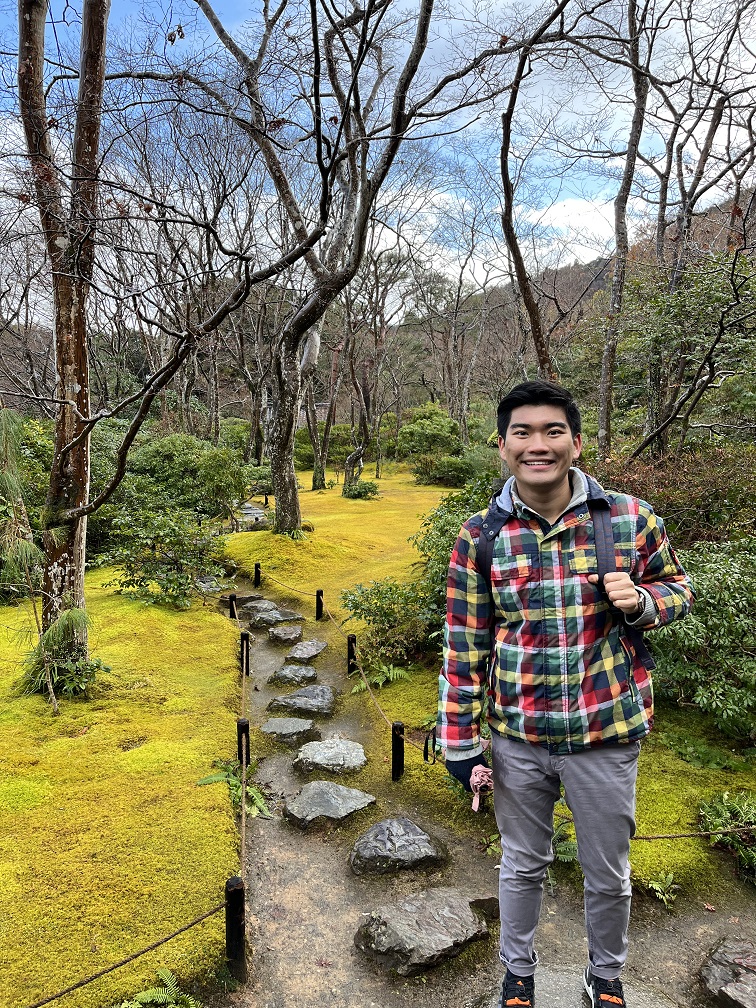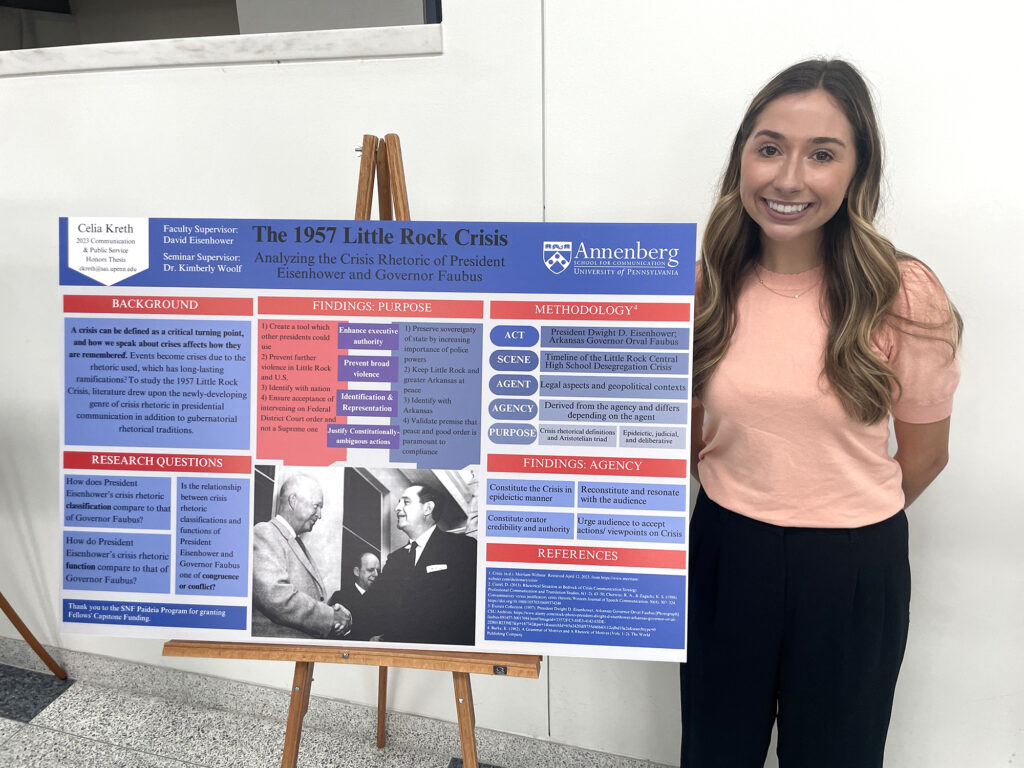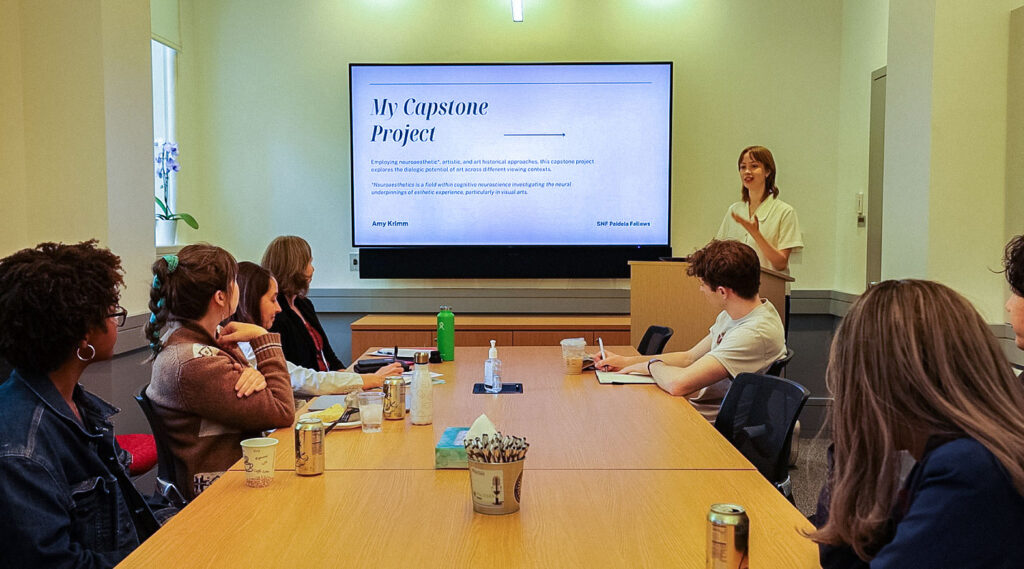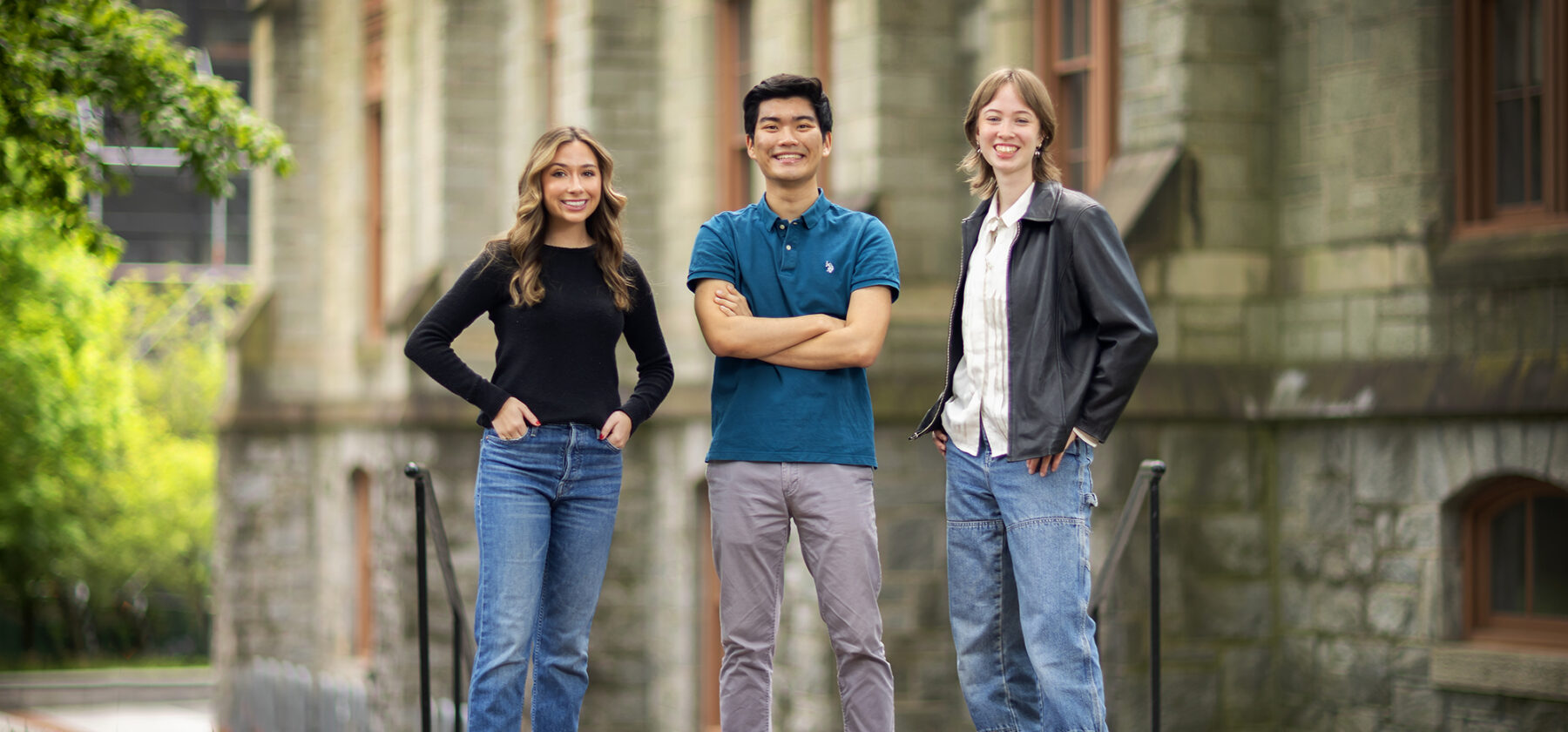In the spring of 2020, the Stavros Niarchos Foundation (SNF) Paideia Program announced its first cohort of Student Fellows. Not only were they the inaugural group in a fledgling program aimed at creating meaningful dialogue across differences, but they were also embarking on the journey at the start of a pandemic. “This group of diverse, talented, and committed students helped us design and build the program even as they participated in it,” says Michael Delli Carpini, the program’s faculty director.
As they Zoomed in from their homes around the globe before eventually returning to campus, they helped lay the groundwork and shape the fellowship program, all while navigating unprecedented times, says Leah Anderson, executive director of SNF Paideia.
“We put up the application for the first round of fellows the Friday before spring break in 2020, and of course nobody came back from spring break,” Anderson says. “They were taking part in a new program, in a totally new environment because of the pandemic, and they stuck with it. They showed up on Zoom, and their persistence and hope in the midst of all sorts of unknowns was inspiring.”
Now, this inaugural cohort of 10 students is set to graduate, taking with them the pillars of the SNF Paideia Program—dialogue, citizenship, service, and wellness—on their next life adventures.
The fellowship program encourages undergraduates to connect their general education and major requirements to public engagement and community building through dialogue across differences. It’s a core part of Penn’s SNF Paideia Program, which launched in 2019 and reimagines the ancient Greek ideal paideia—or “education of the whole person”—for the 21st century and beyond, with courses focusing on dialogue, wellness, service, and citizenship. The fellows’ time in the program culminates with presentations of their senior capstones, which incorporate the program pillars into their area of study, and attendance at the SNF Paideia Nostos conference in Athens at the end of June.
Students in the inaugural cohort say the program has offered them so much more than they expected, from creating a true sense of community, to faculty and staff support and advice, to help and inspiration in crafting their academic trajectories in ways they never imagined their first year on campus.
Finding a path
Today, SNF Paideia fellow Thomas Kyong, from Las Vegas, is an economics and business analytics major at the Wharton School. But when he arrived at Penn his freshman year, he was set on neuroscience, he says.
“I wanted to be a neurosurgeon for 14 years of my life, but during the pandemic, I realized that I was pursuing neuroscience for the wrong reasons,” he says. He wasn’t sure what path to take from there, and that’s when he heard about the Paideia program.

“I thought this would be a good way to immerse myself in a lot of different majors, courses, and opportunities to see what I might want to do and be passionate about,” he says. He briefly majored in political science, philosophy, and economics and then transferred to Wharton, dipping his toes in business economics, public policy, and finance before deciding to pursue a data science major.
“The SNF Paideia Fellowship Program has been there for me since the beginning, supporting and mentoring me through my academic and intellectual journey here at Penn. It has just been really great, and I am very grateful to be part of such an incredible program,” he says, pointing to his check-ins with wellness director Lia Howard as key in helping him get on the right academic track, and to feeling connected and supported.
One of his fondest memories of the program was when they were still remote during the pandemic. He and others started a group chat they called “chef-eia” (a mix of “chef” and “paideia”) to share images of lunches they were eating during class. “You could show off your avocado toast and just munch together while talking about whatever the class topic might be,” Kyong says.
His capstone focuses on how LGBTQ laws affect anti-Asian hate crime as well as East Asian culture, work bolstered by a SNF Paideia-funded trip he took to Japan to collect field study data. “I was able to leverage my identities of being queer and Asian, and use my data science skills,” he says.
For him, dialogue is the pillar that resonates most. “I’m a data scientist, so I love telling stories through data. It’s a powerful skill to have and people with bad intentions can tell stories and communicate numbers in a very sly way. The Paideia program essentially has taught me to value the importance of honest dialogue,” he says.
After graduation, Kyong will be working for American Express, splitting his time between New York City and London. “Being a part of this program has helped me become a lot more secure with who I am with my identities and I’m so grateful.”
Guidance and connection
Fellow Celia Kreth, a communication and public service major from Little Rock, Arkansas, says for her, the SNF Paideia courses stand out as a benefit, with one in particular pivotal to guiding her area of interest and eventual capstone: an Annenberg School for Communication class called Peace Communication: The Use and Abuse oPeace Communication: The Use and Abuse of Communications in Intergroup Conflict, with Samantha Moore-Berg, director of the Peace and Conflict Neuroscience Lab and a lecturer in Annenberg’s undergraduate program.
“It really inspired my capstone project and also my thesis looking at crisis rhetoric,” she says. “The Paideia program helped me narrow down my focus, because I had to be very intentional about how my capstone relates to dialogue and service. It ended up making my thesis a lot more exciting, and exactly what I wanted to study.”
Specifically, her capstone looks at the 1957 crisis in her hometown of Little Rock, analyzing the rhetoric President Dwight D. Eisenhower and Gov. Orval Faubus used. SNF Paideia provided funding for her to travel to the Eisenhower Presidential Library, “which was incredible because I found hundreds of documents that I couldn’t have otherwise gotten. You had to physically sit in the research room and pull them out,” Kreth says.

She says she’s appreciative of being around other students with such diverse interests. “Being in a space with people from all different majors, all different interests, was great. Just getting to bounce ideas off of them and seeing how their brain works in completely different ways is fascinating and provides so many inventive solutions,” she says. “The program is about how people should work together and how dialogue should occur in society. It was kind of like we were our own experiment for making that happen.”
The pandemic made it hard to find guidance and connection, but SNF Paideia provided that and more, Kreth says. “The pillars, combined with the people who made it happen, was probably the most special part.” She appreciates that she can approach conversation in respectful ways and feels strongly that no topic should be off the table.
“That’s incredibly important for going out into the real world, because you’ll be having these conversations with your boss or your coworker, or random people you meet on the street. Those will be skills that will be helpful every day, whether I consciously think about it or not.”
She plans to go to law school eventually and is starting off as a paralegal after graduation. “I still feel so lucky to be in the program,” Kreth says. “I look back today, and I can’t imagine going to Penn without it.”
Bridging disciplines
SNF Paideia fellow Amy Krimm, a visual studies major in the School of Arts & Sciences from Silver Spring, Maryland, applied for the fellowship because it seemed to align with her interests in community engagement. She wasn’t expecting the level of support, academics, and funding that came along with it.
“A lot of the opportunities that I’ve had at Penn were directly because of Paideia funding, and that was something that I wasn’t even aware was an option when applying to the program. That was a really great surprise.”
SNF Paideia classes were some of her favorites courses at Penn, including Angela Duckworth’s Grit Lab and Brooke O’Hara’s and Sharon Hayes’ course on politics and performance.
“In the Grit Lab, I learned so much about myself and other students, and gained a lot of skills. It was pivotal for early in my college career and it still helps remind me to pay attention to what I’m interested in and how I can move forward,” she says.
The performance and politics class was the first performance studies class Krimm took, and she says it shifted her college trajectory. “I wrote a paper in that class on the word ‘embodiment’ that I’ve referenced and quoted and used all throughout the past three years. I didn’t realize it would be so relevant and it has turned out to be a touchstone paper throughout my time at Penn, which is almost like coming full circle,” she says.
Her capstone explores the differences in how people engage with art in a museum versus digital context. As a research assistant at the Penn Center for Neuroaesthetics in the Perelman School of Medicine, Krimm took a more scientific study of art. With SNF Paideia funding, she was able to work in the neuroaesthetics lab, which jumpstarted the project that became her thesis and capstone.

She ran a research experiment in which half the participants looked at art at the Barnes Foundation and half looked at it in the lab. Her aim was to see whether there was a difference in how the art affected people in online versus in-person contexts. She also made a tapestry quilt addressing her research that functions as a visual component of that work. It’s currently on display at the reading room gallery of Fisher Fine Arts Library.
Krimm received the Marshall Scholarship and after graduation, will head to the U.K. to study neuroaesthetics and fine arts or art history. “Paideia showed me that there is a way to bridge different disciplines and interests and it’s given me the tools to do that,” Krimm says.
Full circle
Anderson says it has been extremely satisfying to see how students’ interests and goals have developed since that spring of their first year at Penn, and to watch the ways in which they implemented those interests in creative ways.
“One of our goals for the program was to cultivate an intellectual community among the fellows. To see them showing up for each other in their capstone presentations, it was clear that they have built a sense of community despite all the challenges,” Anderson says. “I’m hopeful that as they graduate, the SNF Paideia program will continue to be part of their mind space, that they continue to have the mantra of dialogue, wellness, service, and citizenship, thinking, ‘How do I integrate that in my new work, my new setting in my workplace, and the community in which I live now?’ We look forward to being in touch with them, and to hear from them how the SNF Paideia mission lives on through them beyond Penn.”
Delli Carpini says listening to the students summarize their capstone projects and how their participation in the SNF Paideia Program helped shape their personal, professional, and civic growth at Penn “was an honor. They made me proud of them and what we have accomplished in such a short period of time.”
“Participating in a new, very experimental program is challenging, especially since much of this participation occurred during the pandemic,” he says. “To a person, these students stepped up to that challenge, and the program is stronger for it. I hope and believe that they are as well.”

